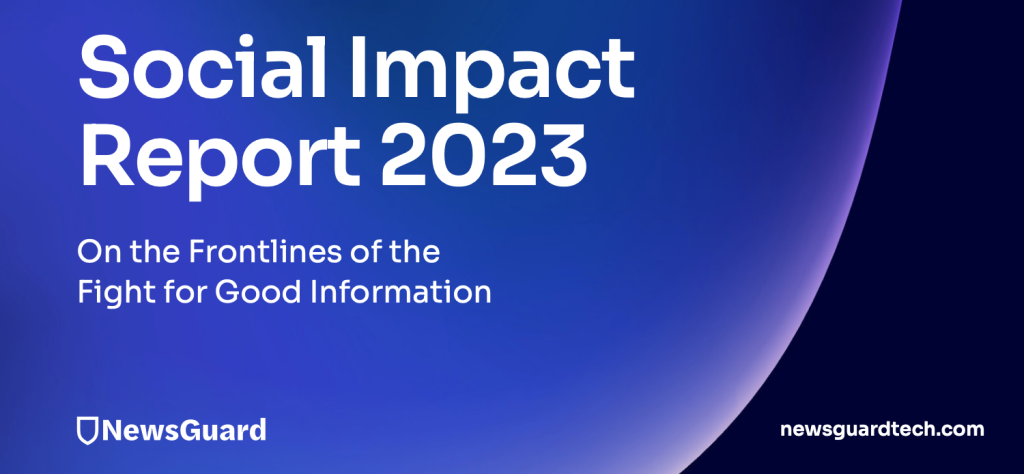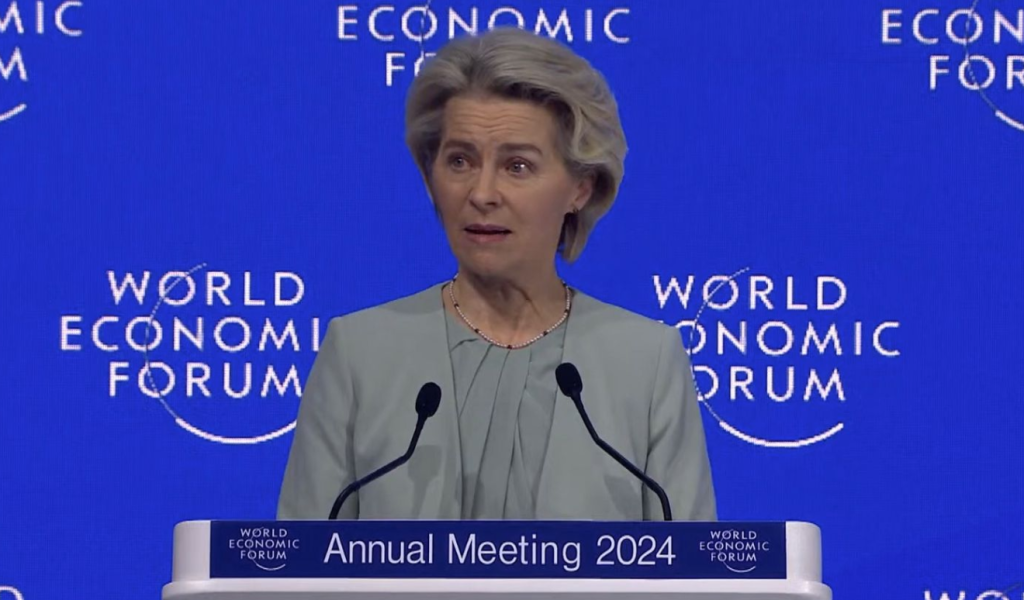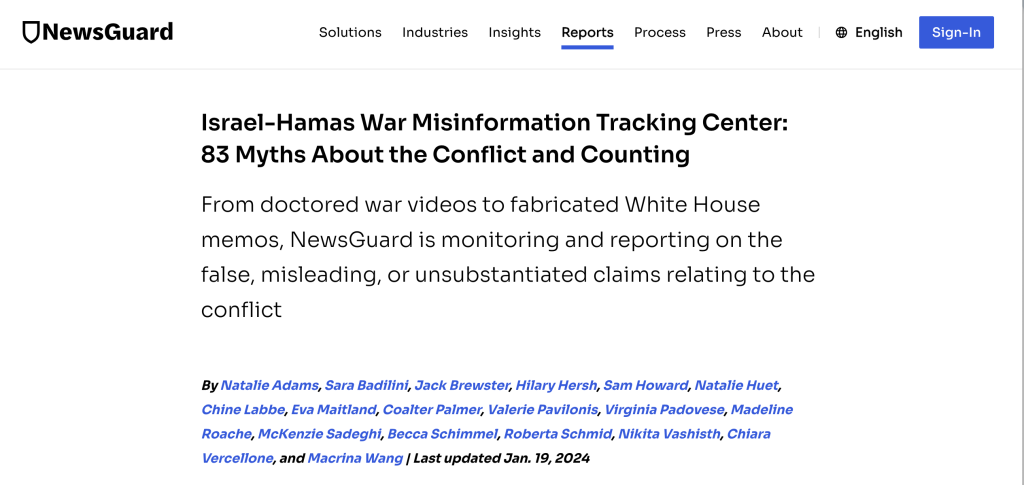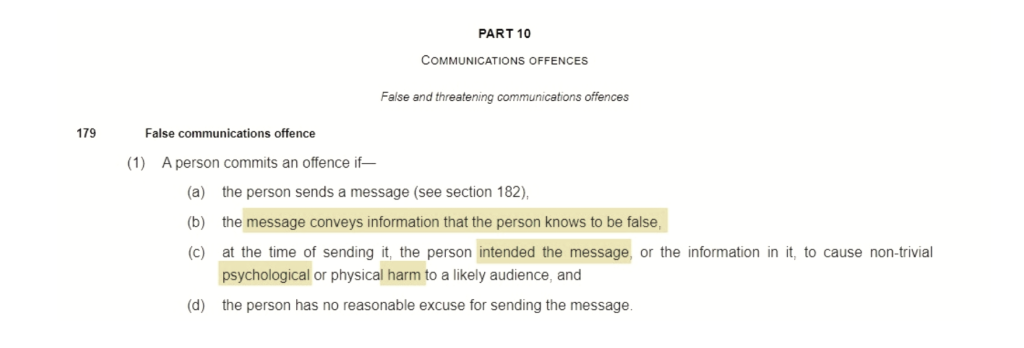While elites at Davos have spelled out their agenda for supercharging censorship this year, NewsGuard coins the term Conspiracy Industrial Complex in the latest inversion of truth. Public private partnerships, ‘media literacy’, technology and censorship laws will all play their part.

Fact-checking and news ratings agency NewsGuard has just released its social impact report for 2023, in which it states it must be “doing something right”, owing to the fact it’s now regularly critiqued by alternative media.
“One of the clearest signs of the impact of NewsGuard’s work is that entities that undermine trust — from malign state actors to partisan groups to misinformation publishers — increasingly focused their conspiracy theories and misinformation attacks on us during 2023. False claims came from the extremes on all political sides and from news sources with low trust scores on all subjects,” an opening letter from the two chief executives, Steven Brill and Gordon Crovitz, begins.
‘Low trust’ according to NewsGuard, but with a growing popular base not least because legacy media trust ratings are crashing across the board. Not only are they not trusted, they’re not making money anymore either. Consider RNZs plummeting Saturday Morning listenership, and TVNZs profit collapse: $59.2 million in 2020/21 plummet to $1.7m in 2022/23, with a projected loss of $15.6m for the current financial year. Heavy losses have been highlighted for MediaWorks, Warner Bros Discovery, and NZME. And Stuff? It’s recent restructure doesn’t sent a great signal.
These numbers say a lot about what the public thinks. But that won’t stop the fake fact checker from continuing to take aim at alternative media through its trust ratings and media literacy programmes. More on that later.
The chief executives’ letter later states: “2023 was a busy year for what we call the Conspiracy Industrial Complex.”
Read more:
Serious threat to free speech online – speak up now
Meet the new thought police: the ‘Orwellian’ researchers working to pathologise dissent
Show us the money: time for transparency from The Disinformation Project
‘Community bridging’: The Disinformation Project’s latest effort to nazify normality
In early 2023, American journalists Michael Schellenberger and Matt Taibbi coined the term the Censorship Industrial Complex, when reporting on the Twitter Files, to describe the public-private censorship behemoth that has been built over the last five to 10 years.
Looking Glass readers will know that this complex has tentacles here in New Zealand too, as I’ve been reporting and commenting on aspects of this since 2021. However, the term ‘Censorship Industrial Complex’ has been a very helpful tool, giving reporters and analysts a handy, but accurate way to describe global efforts to end free speech. Perhaps too powerful, as it’s now being inverted.
The letter is an interesting window into the world of the would be global censors.
It explains that last year NewsGuard was asked by a US “conservative dominated” Congressional Committee to explain itself over playing a role in a censorship regime vis a vis advising on misinformation, in collaboration with the federal government.
“We complied with this voluminous information request, which yielded onerous legal fees, making clear that NewsGuard provides trust information about news sources and claims in the news but doesn’t censor anything. Indeed, when we launched NewsGuard in 2018, we announced our ratings as an alternative to government censorship of the internet.” (emphasis mine). Indeed.
The report also tell us what NewsGuard’s priorities are likely to be going forward. It certainly sees 2024 as a pivotal year for censorship, as do the global elite.
Sign up to receive our newsletter
The year that free speech dies?

The World Economic Forum (WEF) Global Risks Report released at Davos this year states that
misinformation and disinformation related to artificial intelligence (AI) is the biggest risk facing the world in the next two years. This was underlined by EU Commission Ursula Von der Leyen’s speech at WEF earlier this month. Misinformation is clearly priority numero uno.
The proposed solution, she said, is for businesses and governments to collaborate to quash disinformation, particularly in “the biggest electoral year in history”. No surprises there then.
Like Von der Leyen and the WEF, NewsGuard is concerned about electoral integrity, which really means they are running scared of the popular vote and a repeat of Trump’s victory in 2016.
“We now prepare for 2024, when there will be elections in 64 countries affecting 49% of the world’s population, with the grave risk of misinformation undermining confidence in democratic processes. We will work hard to protect voters by empowering them as news consumers, including by identifying false claims by governments hostile to democracies, such as China, Russia, and Iran.”
Media literacy: ‘Clockwork Orange on steroids’
The status report notes that NewsGuard will be accelerating its media literacy work in 2024, in which it targets schools, public libraries and older populations.
“From expanded public library partnerships in Italy and Australia, to the delivery of a yearlong programme educating the UK’s older populations on misinformation and media literacy, thanks to a UK Government grant, our team commits dozens of hours each month to sharing our expertise and building resilience to misinformation among those who are more vulnerable to online harms,” the report states.
Sounds like a good thing right? But as Mike Benz of the Foundation for Freedom Online illucidates, media literacy is a scam. What it is really about, is telling people, largely children and gullible young people, which “regime-compliant” media sources are ok to read and consume.
“Media literacy is literally about training you to be stupid, to be dumb. The underlying presupposition of the field … is that if you do critical thinking you will become a heretic, you will become a wrong thinker, a dissident, a heterodox person. If you think critically, if you go down the rabbit hole, if you do your own independent research you will not trust the regime, you will not trust the system, you will not trust government narratives, you will not trust legacy mainstream media.”
Benz says media literacy programmes teach methods, such as SIFT, that effectively teach people how not to do their own research, pre-banning the ability to even access news institutions that might challenge government narratives.
“This is Clockwork Orange on steroids and it’s being mandated by Governments.”
California, Illinois and New York have passed mandatory media-literacy laws, which will be used to train an army of educators how not to trust alternative news. Benz says this could not be done without huge funding from central government and that the end goal is to destroy the alternative news industry.
So when NewsGuard says that in 2023, it led 59 media literacy training programs, reaching more than 4,500 participants, most of them run for free, we should be concerned.
NewsGuard reports that it has:
- partnered with the UK Government’s Media Literacy Programme Fund to deliver programmes for older people
- renewed a partnership with the American Federation of Teachers for a second year, in which it provides free access to NewsGuard’s browser extension and weekly Misinformation Risk Briefings to its 1.7 million members
- partnered with 894 libraries around the world
“All of NewsGuard’s public library partnerships are made possible thanks to Microsoft’s support and continued partnership.”
So central governments and mega corporates. Public private partnerships.
Sign up to receive our newsletter
NewsGuard in New Zealand
As The Looking Glass previously reported, NewsGuard launched in Australia and New Zealand last year, and has since run briefing sessions for journalists for whom its browser extension was provided for free. Those journalists receive regular reports from NewsGuard about what ‘misinformation’ might be circulating.
NewsGuard also reports that its Reliability Ratings and Misinformation Fingerprints™ tools are being used by researchers looking into Russian, Chinese and Iranian disinformation, electoral integrity issues, healthcare and online news consumption.
Are our mates at The Disinformation Project, and New Zealand’s very own ‘disinformation research’ kingpin, Byron Clarke, are making good use of these products?

Lastly, it’s worth noting that NewsGuard issued a couple of reports to journalists about Israel’s war on Gaza, which it framed as the Israel-Hamas war, and launched metadata tags for sites publishing ‘misinformation’ on the conflict. It also launched a new “Israel-Hamas War Misinformation” category for its Misinformation Fingerprints tool.
Dovetailing agendas
Personally, I find it very telling that as far as NewsGuard is concerned, all the misinformation about this conflict is coming from the Hamas side. Just as I find it very telling that NewsGuard’s priorities line up perfectly with WEFs priorities.
It is the clearest indication that NewsGuard is exactly what its critics accuse it of being – an intelligence agency asset that the US Government (and others no doubt) outsources its censorship to, because it doesn’t want to be seen to be doing itself.
Recall how under Jacinda Ardern’s draft disinformation strategy, officials were preoccupied with creating a veneer of legitimacy through outsourcing ‘disinformation’ monitoring to academia, media and the private sector, lest it ‘appeared’ to be monitoring speech and contributing to ‘conspiracy theories’ about governmental overreach?
Well, NewsGuard openly admits it’s an alternative (proxy) for government censorship. Perhaps we should believe them.
Read more:
The Disinformation Project is infiltrating unions, civil service, journalism
‘Fact-checker’ NewsGuard quietly launches in Australasia
Ministry of Truth NZ: The documents that reveal the government’s many tentacled approach to mass political monitoring
‘Misinformation’ used as justification for tracking and censoring lawful speech by secretive British government units
Military intelligence model?
In an interview with Reality Check Radio (RCR) last year, Benz commented that the strategy exposed in these government documents so closely mirrored the military intelligence structure for censoring the internet that came about during Ukraine’s Euromaidan crisis that it signaled a much wider and all encompassing censorship complex than he had previously established.
The clandestine Integrity Initiative (a UK funded ‘fake NGO’ that was used to smear Russia) pioneered a ‘cluster cell structure’ that spanned academia, journalism, media personalities, cultural figures, military leaders and financial regulators to create a whole-of-society, whole-of-government censorship set up, so they could each lend their special set of skills to take down any emerging narrative that threatened an important agenda. It came to light after a staffer leaked strategy documents in 2018 and 2019.
Benz told RCR, “I have to wonder if it’s all the way down to New Zealand, where was it not put in place during Covid?” He made reference to both the strategy documents, and also the model apparently adopted by our very own shady outfit, The Disinformation Project.
It’s abundantly clear that the Censorship Industrial Complex is not only a trans-Atlantic consensus, it’s also includes Five Eyes countries and the EU. It’s a truly global public private censorship partnership with its claws in our NGOs, media, schools, universities, libraries, newsrooms, unions, government departments and corporations, and even social media influencers.


Forcing a values change
It’s goal is to force a values change in western society, away from free speech and freedom more generally, towards much greater government control over our everyday lives. As I’ve often said, it aims to not just create acceptance of censorship, but a demand for it. The ‘woke’ generation embody it’s success.
Along with all the online censorship legislation coming into force or making its way though law making processes around the world – see the UKs Online Safety Bill as an example, which explicitly permits legacy media to “knowingly publish false information with intent to cause non-trivial harm”, while independent and alternative media players can be sent to jail for a year for the same – there are likely to be other, more creative ways of doing censorship too.
Microsoft chief executive Satya Nadella said in a recent interview that the company intended to fight disinformation around the 2024 US elections. “This is not the first election where we dealt with disinformation or propaganda campaigns by adversaries and election interference,” he said.
“We’re doing all the work across the tech industry around watermarking, detecting deep fakes and content IDs. There is going to be enough and more technology quite frankly in order to be able to identify the issues around disinformation and misinformation.”
So when elites tell us that censoring mis and disinformation is their biggest priority in 2024, we better believe them too, and be ready for what they have in store.
Should alternative/independent media seriously consider investing in print journalism and distribution networks again? It may well be time.